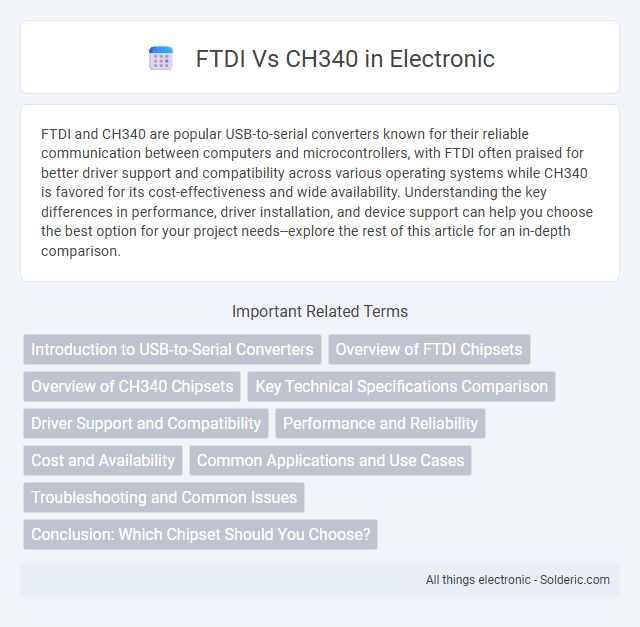FTDI and CH340 are popular USB-to-serial converters known for their reliable communication between computers and microcontrollers, with FTDI often praised for better driver support and compatibility across various operating systems while CH340 is favored for its cost-effectiveness and wide availability. Understanding the key differences in performance, driver installation, and device support can help you choose the best option for your project needs--explore the rest of this article for an in-depth comparison.
Comparison Table
| Feature | FTDI | CH340 |
|---|---|---|
| Manufacturer | Future Technology Devices International | WCH (Nanjing QinHeng Electronics) |
| Chip Model | FT232R, FT231X | CH340G, CH341 |
| USB Versions Supported | USB 2.0 Full-Speed | USB 1.1 / 2.0 Full-Speed |
| Driver Support | Wide OS support: Windows, macOS, Linux | Common OS support: Windows, Linux (limited macOS) |
| Price | Higher cost | Low cost |
| Reliability | High stability, industry standard | Moderate stability, budget option |
| Applications | Professional development, industrial | Consumer electronics, DIY projects |
| Package Types | SOP-28, QFN, SSOP | SOP-16 |
| Power Consumption | Moderate | Low |
| Community Support | Extensive | Growing but smaller |
Introduction to USB-to-Serial Converters
USB-to-serial converters like FTDI and CH340 enable communication between USB ports and serial devices, essential for programming microcontrollers and debugging. FTDI chips offer robust driver support and reliable data transfer rates, making them favored in professional environments. CH340 provides a cost-effective alternative with wide compatibility, often used in budget-sensitive projects and hobbyist applications.
Overview of FTDI Chipsets
FTDI chipsets, developed by Future Technology Devices International, are widely recognized for their reliable USB-to-serial communication interfaces and robust driver support across multiple operating systems. These chipsets provide high compatibility with various microcontrollers and development boards, making them a preferred choice for professional and industrial applications. Known for stable performance and extensive documentation, FTDI devices ensure seamless data transfer and device recognition without frequent driver conflicts.
Overview of CH340 Chipsets
CH340 chipsets are widely recognized for their cost-effectiveness and broad compatibility, especially in USB-to-serial communication applications. These chipsets support multiple serial interfaces, including UART and SPI, making them versatile for various electronic projects and embedded systems. Your choice of CH340 can provide reliable performance at a lower price compared to alternatives like FTDI, especially in mass production scenarios.
Key Technical Specifications Comparison
The FTDI FT232RL features a USB 2.0 full-speed interface with data rates up to 3 Mbps, integrated EEPROM for customization, and robust driver support across Windows, macOS, and Linux platforms. The CH340 primarily supports USB 1.1 with data transfer speeds up to 2 Mbps and offers basic serial communication without onboard EEPROM, which limits configuration flexibility. FTDI chips provide enhanced signal integrity with built-in overcurrent protection and are known for stable, reliable UART communication compared to the cost-effective but less feature-rich CH340.
Driver Support and Compatibility
FTDI offers extensive driver support across Windows, macOS, and Linux, ensuring seamless compatibility with most systems and professional applications. CH340 provides basic driver support primarily for Windows and limited versions of macOS and Linux, often requiring manual installation or third-party drivers. FTDI drivers are frequently updated and digitally signed, improving system stability and security, while CH340 drivers may cause compatibility issues on newer operating systems.
Performance and Reliability
FTDI chips are widely recognized for their superior performance with stable data transmission rates up to 3Mbps and low latency, making them ideal for professional and industrial applications requiring high reliability. CH340, while more cost-effective, often exhibits inconsistent performance with higher susceptibility to driver issues and occasional communication errors, which can impact stability in critical systems. The FTDI's robust driver support and proven durability contribute to its reputation for long-term reliability compared to the CH340's variable operational consistency.
Cost and Availability
CH340 chips are significantly more cost-effective compared to FTDI, making them a popular choice for budget-conscious electronics projects and mass production. FTDI chips maintain higher availability through widespread distribution and robust supply chains, ensuring consistent access for professional developers and manufacturing. CH340's affordability often comes with occasional availability fluctuations, especially during high demand periods.
Common Applications and Use Cases
FTDI chips are widely used in professional and industrial applications requiring reliable USB-to-serial communication, such as embedded systems, microcontroller programming, and medical devices. CH340 converters are favored in budget-sensitive projects, including Arduino clones, hobbyist electronics, and basic USB communication tasks. Both are popular in firmware development environments but differ in driver support and robustness, influencing their use cases accordingly.
Troubleshooting and Common Issues
FTDI chips are known for stable USB-to-serial connections with robust driver support across Windows, macOS, and Linux, reducing common issues such as driver conflicts and device recognition errors. CH340 devices often face driver installation challenges and compatibility problems on certain operating systems, leading to frequent troubleshooting involving manual driver updates and reset procedures. Users report that FTDI adapters generally experience fewer connection drops and data loss compared to CH340, making them preferable for critical serial communication tasks.
Conclusion: Which Chipset Should You Choose?
The FTDI chipset offers superior driver stability and broad OS compatibility, making it ideal for professional and industrial applications where reliability is crucial. The CH340 provides a cost-effective alternative with widespread support for basic serial communication tasks, suitable for hobbyists and budget-conscious projects. Your choice depends on whether you prioritize robust performance with FTDI or affordability with CH340 without compromising essential functionality.
FTDI vs CH340 Infographic

 solderic.com
solderic.com